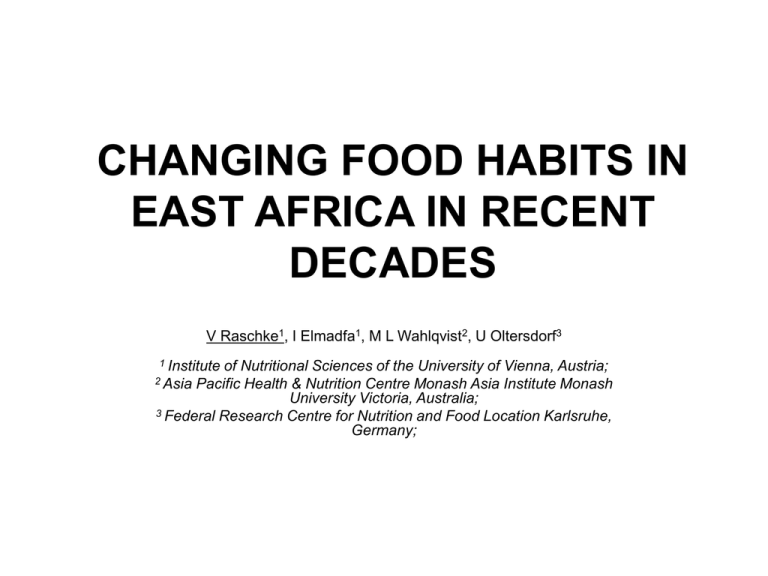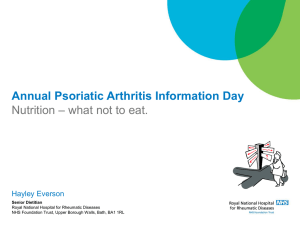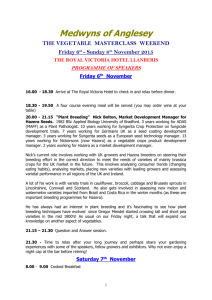CHANGING FOOD HABITS IN EAST AFRICA IN RECENT
advertisement

CHANGING FOOD HABITS IN EAST AFRICA IN RECENT DECADES V Raschke1, I Elmadfa1, M L Wahlqvist2, U Oltersdorf3 1 Institute of Nutritional Sciences of the University of Vienna, Austria; 2 Asia Pacific Health & Nutrition Centre Monash Asia Institute Monash University Victoria, Australia; 3 Federal Research Centre for Nutrition and Food Location Karlsruhe, Germany; Introduction There is only scattered scientific evidence about changes of traditional food habits to westernized diets in Africa. Baseline empirical data is lacking and precise data are still difficult to collect.1 To achieve and maintain good health people must have basic knowledge about the importance of proper food habits for their health. Aim • • • Is it possible to raise awarness of the importance of African food cultures through providing base line data on the web? This project is going provide a reference point for future research via a web site on “African Food Cultures” as an effort to further stimulate appropriate Food Habits research in Africa; An online questionnaire is going to evaluate people’s knowledge and opinion about traditional African Food Cultures; Methods – This project is based on a precious and unique collection of literature and data from East Africa in the 1970ties, which document relevant scientific literature in different disciplines (e.g. Anthropology, Human Nutrition; Food Habit Studies, etc.); These unpuplished data have been stored at the Univeristy of Karlsruhe (Germany) for the last 30 years, after the Max Planck Reasearch Unit in “Tanganyika” (German East Africa) was shut down in the 1970ties; – Through my PhD I have been given the exciting opportunity to analyse the literature and dataset and make it available to the public via the internet. – A Questionaire during this conference will assess your thoughts about the development of a web site on FOOD HABITS IN AFRICA and wheter it could be of future importance. You are welcomed to show your interest! Results • This “work in progress” is a multidisciplinary approach designed to obtain qualitative information on food habits in Africa over the web entered via the healthyeatingclub website http://www.healthyeatingclu b.com/ • Example for obtained data on East Africa (1960ties): Results of 2 dietary surveys among 2 Kenyan tribes (Figure 1) Figure 1. a-nnDietary surveys, 1-51Nutritional status surveys, carried out in East Africa during the 1970ties Table 1. Dietary survey information Kikuyu Calorie consumption Luo 3000 2000 Dates of Survey Calories Sample size 31.05.1965- 04.10.1965- 07.06.1965 11.10.1965 142 1000 0 Kikuyu Tribes 116 21 families Luo 21 families Distribution of calorie s Kikuyu tribe Table 3. Typical menu for Nyanza region; Luo tribe 11% 9% Prot ein Fat Early morning Uji (gruel made from maize or millet) Carbohydrat es or Tea 80% Distribution of calorie s Luo tribe Midday Ugali (stiff maize or millet mixture) and 12% green vegetables 9% Evening 79% Ugali and fish stew Table 2. Average nutrient consumption Tribe Kikuyu Luo Main food source Protein 48 g Cereals Calcium 259 mg Fruit & Vegetable Iron 17 mg Cereals Vitamin A 1583 I.U. Fruit & Vegetable Thiamine 1,4 mg Cereals Riboflavin 0,84 mg Fruit & Vegetable Vitamin C 130 mg Fruit & Vegetable Protein 73 g Cereals, Fish Calcium 987 mg Animal food Iron 27 mg Cereals Vitamin A 1305 I.U. Fruit & Vegetable Thiamine 1,8 mg Cereals Riboflavin 0,9 mg Fruit & Vegetable Vitamin C 87 mg Fruit & Vegetable Conclusion A website on African Food cultures should be of enormous benefit to Human Development in Africa and elsewhere. References 1. Oniango R K: Food habits in Kenya: The effects of change and attendant methodological problems. Appetite 1999; 32:93-96. 2. Bohdal M, Gibbs N E, et al. (1964-1968). Nutrition survey and campaign against malnutrition in Kenya, Ministry of Health Kenya. •











